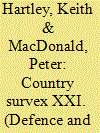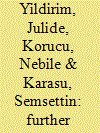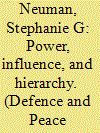|
|
|
Sort Order |
|
|
|
Items / Page
|
|
|
|
|
|
|
| Srl | Item |
| 1 |
ID:
095039


|
|
|
|
|
| Publication |
2010.
|
| Summary/Abstract |
The UK defence economy has some distinctive features. Its Armed Forces have a worldwide capability reflected in modern air, land and sea forces with an expeditionary role. Its world role is further reflected in a nuclear capability and a high technology defence industrial base, substantial defence R&D with the UK as a major arms exporter. This survey focuses on the period 1970 to 2008. It explains the military-industrial complex and estimates a demand for military expenditure function. There follows an analysis of procurement and defence industrial policy. Future policy issues are outlined, namely, the costs of the UK's world role and its relations with European defence policy. It is concluded that the UK faces some difficult defence choices.
|
|
|
|
|
|
|
|
|
|
|
|
|
|
|
|
| 2 |
ID:
095038


|
|
|
|
|
| Publication |
2010.
|
| Summary/Abstract |
This paper considers the second Lancet survey of mortality in Iraq published in October 2006. It presents some evidence suggesting ethical violations to the survey's respondents including endangerment, privacy breaches and violations in obtaining informed consent. Breaches of minimal disclosure standards examined include non-disclosure of the survey's questionnaire, data-entry form, data matching anonymised interviewer identifications with households and sample design. The paper also presents some evidence relating to data fabrication and falsification, which falls into nine broad categories. This evidence suggests that this survey cannot be considered a reliable or valid contribution towards knowledge about the extent of mortality in Iraq since 2003.
|
|
|
|
|
|
|
|
|
|
|
|
|
|
|
|
| 3 |
ID:
095041


|
|
|
|
|
| Publication |
2010.
|
| Summary/Abstract |
Previous empirical studies examining the determinants of re-enlistment probabilities have generally employed a univariate approach and have suggested that expected further education increases the likelihood of joining the army. However, the re-enlistment and further education decisions can be interdependent. Accordingly, this study employs a seemingly unrelated bivariate probit model to jointly estimate the factors that influence both further education and re-enlistment decisions. Empirical analysis indicates that there is a correlation between the re-enlistment and further education decisions, revealing that previous single equation models might be misspecified. Moreover the geographical background, education level of the conscript, intention of further education and previous unemployment duration are influential in the re-enlistment decision. Additionally, the further education decision appears to be determined by family and sibship characteristics, education level and age.
|
|
|
|
|
|
|
|
|
|
|
|
|
|
|
|
| 4 |
ID:
095040


|
|
|
|
|
| Publication |
2010.
|
| Summary/Abstract |
Using the ITERATE dataset, we explore the origins of transnational terrorist activity, from 1982 through 1997, in 118 countries. We model terrorism, not as a function of a nation's ethnic, religious or linguistic fractionalization, but as an independent measure of perceived ethnic tensions. When we control for institutional quality, evidence that political rights and civil liberties mitigate the terrorism-producing effects of ethnic tensions exists only since 1990. Economic freedoms, on the other hand, robustly reduce the number of terrorist attacks originating in ethnically tense societies.
|
|
|
|
|
|
|
|
|
|
|
|
|
|
|
|
| 5 |
ID:
095042


|
|
|
|
|
| Publication |
2010.
|
| Summary/Abstract |
The global defense-industrial sector reflects the hierarchy of power in the post-Cold War world. As in the larger international system, the United States plays the dominant role in the defense sector as well. It is a comparative advantage often used by US policymakers to influence the foreign policy behavior of other states. Curiously, the radical concentration of the world's defense industrial sector, as described here, has received relatively little scrutiny from either academia or the media, even though it not only reflects the international order but provides the United States with considerable leverage in it.
|
|
|
|
|
|
|
|
|
|
|
|
|
|
|
|
|
|
|
|
|